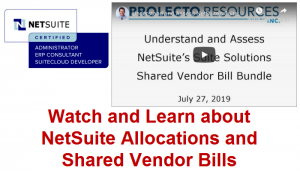This article is relevant if you are challenged by needing to allocate expenses across your NetSuite based subsidiaries.
Background
In larger organizations that have multiple subsidiaries and divisions, a common organizational structure is to create a shared services group so that each subsidiary can enjoy the economies of scale by sharing personnel and other resources. It is common to see a shared accounting services group perform the bookkeeping and reporting for all organizations.
You may find in this model that treasury operations are going to be consolidated to take advantage of banking relationships and leverage the collective capacity of the organization. In these situations, you may find that the accounts payable and cash disbursement operations need to be centralized.
NetSuite’s One World provides a great framework for a single database that is partitioned logically by the subsidiary. Yet, this logical partition, while strong for having trial balance fidelity, can produce a challenge in shared services environments. In the case of accounts payable operations, cash and accounts payable in one subsidiary are firmly independent of the other subsidiaries in the shared tree.
One pattern is to enter accounts payable at the subsidiary level which provides great traditional AP aging and other reporting which helps forecast the demand for cash. Yet, if you need to produce a payment from a cash account that is not part of the subsidiary tree (perhaps in the shared bank account), the model is not out-of-the-box supported.
A different pattern is to enter bills in one subsidiary that then need to push into other subsidiaries. Perhaps multiple subsidiaries are sharing a single building but the building rent needs to allocated to the related organizations for their share of the burden.
NetSuite Shared Vendor Bills Bundle
As of the beginning of 2019, for existing NetSuite customers, NetSuite has made available, free of license charge, a number of bundles that have been developed by the internal SuiteSolutions group (see SuiteAnswers Article). This is great news for the community as the free license makes it much easier to evaluate NetSuite software offerings.
The bundle attempts to solve some of the challenges faced by entering a vendor bill that contains expenses that need to be spread to other subsidiaries. With the free of charge access to the bundle, we now can more easily make assessments about the functionality to understand if the software can address specific allocation concerns.
Comparing NetSuite Provided Allocation Methods
Most larger NetSuite organizations elect to activate NetSuite Advanced Accounting which contains a feature called Allocation Schedules. All NetSuite accounts also have a technology, SuiteGL, that allows you to manipulate the posting routines. These offerings should be compared to the NetSuite SuiteSolutions Shared Vendor Bill bundle.
- Allocation Schedules (Advanced Accounting): the orientation is to take a summary GL account and to reclass or spread the values to other accounts and, if desired, between subsidiaries. Although not mandatory, I consider this tool to be applicable in period end situations. I have written before on this topic. See my article, Learn the Power of Dynamic NetSuite Allocations using Statistical Accounts.
- SuiteGL: there are ways to use SuiteGL to modify NetSuite’s default posting behavior of a transaction. The tool only has the capacity, as of this writing, to create entries within one subsidiary. My firm has done quite a bit with this technology and we give our clients a free of charge tool we built called the Prolecto GL Reclasser. See my previous article, Learn How To Automate NetSuite Accounting Reclass Entry Work.
- Shared Vendor Bills: this tool, the one we are evaluating here, takes an approach that allows you to transactionally (a vendor bill) generate related (intercompany) journal entries allowing you to spread values to other accounts.
Solving the Shared Services Model with the Bundle
In my mind, the simple way to think about the Shared Vendor Bill bundle is that it makes transactional what the Allocations feature does for GL Summary accounts. This can be very valuable especially if there are certain transactions that need very specific accounting treatment.
The bundle can be a tool in the shared services model business practice. I would not ask it to solve the consolidated cash requirement challenge mentioned above. I intend to write about solving for those situations in another article as it frequently comes forth in consolidated cash receipts and cash disbursement flows in centralized business operations.
Video-Based Assessment: NetSuite Shared Vendor Bills Demonstration (15:37)
I am grateful for Meir B., a consultant in our firm that evaluated the software and produced assessments. Watch the video (15:37) below to understand how the software works and gain an appreciation for how to prepare to succeed in implementation.
Roll Out your NetSuite Allocations
Allocations are an interesting topic domain. Depending on how you approach the subject, how you ultimately act on it will affect your day-to-day NetSuite use and it will demand developing practices to stay under control. In my mind, there is a balance between period end and transactional approaches. While NetSuite offers built-in capacities, let’s always remember that we also have the power of the NetSuite platform to “do it our own way”. In all cases, it’s important to keep in mind the return in automation relative to the effort of getting the tools and practices in place.
If you found this article helpful, feel free to subscribe to get notifications of new articles. If you have a specific NetSuite allocation challenge, let’s have a conversation.

















